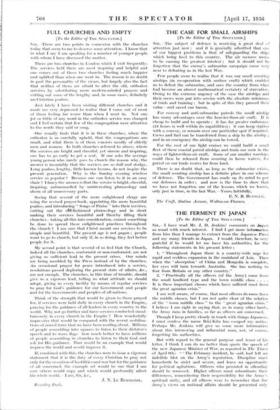THE CASE FOR SMALL AIRSHIPS [To the Editor of '1.`n
SrEcrirott.] Sin,—The subject of defence is receiving a great deal of attention just now ; and it is generally admitted that one Of our biggest problems is that of safeguarding the ships -elich bring food to this country. The air 'menace seems to be causing the greatest interest ; but it should not be forgotten that the enemy's -subMarine campaigncame very near to defeating us in the last War.
Few people- seem to realise that it was our small scouting airships (in co-operation with surface craft) which enabled s.
us to defeat the submarine, and save the country front what had become an almost mathematical certainty of starvation. Owing to the extreme urgency of the case the airships awl their crews were put into service with the absolute minimum of trials and training ; but in spite of this they proved their valuel—and saved Our bacon.
For convoy and anti-submarine patrols the small airship has many advantages over the heavier-than-air craft. It is cheap to build and to operate ; it has far greater -endurance (24 hours is well within its capabilities) ; it can keep station with a convoy, or remain over one particular spot if reqnired. Crews and fuel can be transferred front a ship to the airship ; and in an emergency the airship can be towed.
For the cost of one light cruiser we could build a small fleet of these coastal patrol airships and train our men in the ways of lighter-than-air craft. Some of our smaller warships could then be released from- scouting in home waters, tor patrol on our trade routes far from land.
There is no doubt that, as long as the submarine exists, the small scouting airship has a definite place in our scheme of defence. The Government has made up its mind to put our defences in order ; and now is the time to show that we have not forgotten one of the lessons which we learnt, only just in time-, in the hist War.—Yours faithfully, • E. N. B. BENTLEY. The Croft, Station Avenue, Walton-on-Thames.












































 Previous page
Previous page